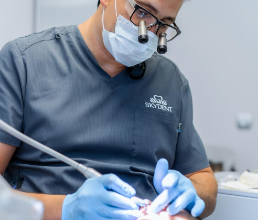Exploring Dental Sedation Services in Richmond: A Guide to Comfortable Dental Care

Understanding Dental Sedation Services in Richmond
Let’s talk about dental sedation services in Richmond. If you’re feeling uneasy about going to the dentist, you’re not alone. Lots of people get anxious about dental visits, and that’s where sedation comes in. It’s designed to help you relax and feel more comfortable during your appointment. It can be a real game-changer for those who have put off dental work because of fear.
What Is Dental Sedation?
Dental sedation is basically using medication to help you relax during dental procedures. It can range from mild sedation, where you’re still awake but calm, to deeper sedation, where you’re barely aware of what’s happening. The goal is to make the experience less stressful and more manageable, whether you’re getting a simple cleaning or something more involved.
Types of Sedation Available
There are a few different types of sedation that dentists in Richmond might use:
- Inhaled Sedation: Often called “laughing gas,” this is a mild sedative that you breathe in through a mask. It wears off quickly, so you can usually drive yourself home afterwards.
- Oral Sedation: This involves taking a pill before your appointment. It makes you drowsy, and you’ll need someone to drive you home.
- IV Sedation: Administered through a vein, this type of sedation allows the dentist to adjust the level of sedation more precisely. You’ll be very relaxed, and you might not remember much of the procedure.
Benefits of Sedation Dentistry
Sedation dentistry offers several benefits, especially for those with anxiety or special needs:
- Reduces Anxiety: The most obvious benefit is that it helps calm your nerves and makes you feel more at ease.
- Pain Management: While not a replacement for local anesthesia, sedation can increase your pain threshold and make procedures feel less intense.
- Efficient Treatment: Because you’re more relaxed, the dentist can often work more quickly and efficiently.
Sedation can be a really helpful tool for people who have had bad experiences in the past or who are just naturally anxious about dental work. It’s worth talking to your dentist about whether it’s right for you. It can make a world of difference in how you feel about going to the dentist.
Managing Dental Anxiety Effectively
Dental anxiety is a real thing, and it keeps a lot of people away from the dentist. But it doesn’t have to! In Richmond, there are ways to manage dental anxiety effectively, so you can get the care you need without all the stress.
How Sedation Helps with Anxiety
Sedation can make a huge difference if you’re anxious about dental work. It works by:
- Reducing awareness: Sedation helps to reduce your awareness of the sights, sounds, and smells of the dental office, which can be triggers for anxiety.
- Promoting relaxation: It helps you relax, so you’re less tense and worried during the procedure.
- Decreasing pain perception: Some types of sedation can also decrease your perception of pain, making the experience more comfortable.
Signs You May Need Sedation
How do you know if sedation is right for you? Here are some signs:
- You feel extremely nervous or fearful at the thought of going to the dentist.
- You’ve had negative dental experiences in the past.
- You avoid dental appointments altogether because of anxiety.
- You have a strong gag reflex that makes dental work difficult.
- You have trouble sitting still for extended periods.
Patient Testimonials on Sedation
Real stories from real people can make a difference. Here’s what some patients have said about their experiences with sedation dentistry:
- “I used to dread going to the dentist, but with sedation, I was able to get a filling without feeling any anxiety at all.”
- “Sedation helped me overcome my fear of needles, and now I can get the dental care I need without any problems.”
- “I was so relaxed during my procedure that I almost fell asleep! It was a completely different experience than I expected.”
Sedation dentistry can be a game-changer for people with dental anxiety. It allows them to receive necessary treatments in a relaxed and comfortable environment, improving their oral health and overall well-being. Don’t let fear hold you back from getting the care you deserve.
Preparing for Your Sedation Appointment
So, you’ve decided on dental sedation – awesome! Now, let’s talk about getting ready. “Preparation is key to making things go smoothly,” and that’s especially true when sedation is involved. It’s not just showing up; there are a few things you should know and do to make sure everything goes off without a hitch. This section will walk you through what to expect and how to prepare for your upcoming appointment.
What to Expect Before Sedation
Okay, so before you even get to the dentist’s chair, there are a few things that will happen. First, there’s usually a consultation. This is where you chat with your dentist about your medical history, any medications you’re taking, and your anxiety levels. They’ll explain the type of sedation they recommend and why. Don’t be shy about asking questions! It’s your chance to clear up any concerns. You might also need to get some blood work done, just to make sure everything is in order. The dentist will give you specific instructions, and it’s super important to follow them closely.
How to Prepare for Your Visit
Alright, let’s get down to the nitty-gritty of preparing for your sedation appointment. Here’s a quick rundown:
- Food and Drink: Usually, you’ll need to avoid eating or drinking anything for a certain number of hours before your appointment. Your dentist will give you the exact timeframe, but it’s often around 6-8 hours for food and 2 hours for clear liquids. This is important to prevent complications during sedation.
- Medications: Talk to your dentist about any medications you’re currently taking, including over-the-counter drugs and supplements. They’ll let you know if you need to adjust your dosage or stop taking anything before the appointment. In most cases, you can take your medications as usual, but always double-check.
- Clothing: Wear loose, comfortable clothing. Layers are a good idea because your body temperature can drop a bit under sedation. Avoid wearing a ton of jewelry or accessories.
- Transportation: You absolutely cannot drive yourself home after sedation. You’ll need to arrange for someone to drive you and stay with you for a few hours afterwards. Public transportation isn’t a great idea either, as you’ll likely be groggy.
- Medical History: Make sure your dentist has a complete and accurate medical history, including any allergies or past reactions to medications. This is crucial for your safety.
Following these steps ensures a smooth and safe sedation experience. It’s all about being prepared and communicating openly with your dental team.
Post-Procedure Care Tips
So, you’ve had your dental work done, and the sedation is wearing off. What now? Here are a few tips for post-procedure care:
- Rest: Take it easy for the rest of the day. Avoid strenuous activities and just relax.
- Hydration: Drink plenty of fluids to stay hydrated. Stick to clear liquids at first, and then gradually introduce more substantial foods as you feel up to it.
- Diet: Start with soft, easy-to-chew foods. Avoid anything hard, crunchy, or spicy that could irritate the treated area.
- Medications: If your dentist prescribed any pain medication, take it as directed. If you experience any unusual symptoms or have concerns, don’t hesitate to call your dentist’s office.
- Oral Hygiene: Follow your dentist’s instructions for oral hygiene. You may need to avoid brushing or flossing in certain areas for a day or two. Gently rinse your mouth with warm salt water to keep the area clean.
Exploring Different Sedation Options
When it comes to dental care, many people feel anxious. Thankfully, Richmond dentists provide various dental anxiety sedation options to make your visit more comfortable. Let’s explore what’s available.
Inhaled Sedation Explained
Inhaled sedation, often using nitrous oxide (laughing gas), is a mild form of sedation. It’s administered through a mask that you wear during the procedure. Here’s what you should know:
- It works quickly, helping you relax within minutes.
- The effects wear off rapidly after the mask is removed, allowing you to drive yourself home.
- It’s a good option for people with mild anxiety or for shorter procedures.
Inhaled sedation is a safe and effective way to ease anxiety during dental treatments. It allows you to remain conscious and responsive while feeling calm and relaxed.
IV Sedation Overview
IV sedation involves administering medication directly into your bloodstream through an IV line. This method offers a deeper level of sedation compared to inhaled options. Here’s what to expect:
- You’ll feel very relaxed, and you might not remember much of the procedure.
- The level of sedation can be adjusted during the procedure to ensure your comfort.
- It’s often used for more complex or lengthy treatments.
Oral Sedation Benefits
Oral sedation involves taking a pill before your dental appointment. The medication helps you relax and reduces anxiety. Here’s what you need to know:
- You’ll need someone to drive you to and from the appointment, as the effects can last for several hours.
- It’s a convenient option for people who don’t like needles.
- The dentist will determine the appropriate dosage based on your anxiety level and medical history.
Finding the Right Sedation Dentist in Richmond
Finding a dentist who offers sedation services is a big step toward comfortable dental care, especially if you experience anxiety. But how do you find the right sedation dentist in Richmond? It’s more than just a quick search; it’s about finding someone you trust and feel comfortable with. You might even be looking for a great kids dentist in Richmond who also offers sedation options for younger patients who are nervous about dental visits. Let’s explore what to look for.
Qualities to Look For
When searching for a sedation dentist, consider these qualities:
- Experience with Sedation: How long have they been providing sedation? What types of sedation do they offer regularly?
- Certifications and Training: Are they certified in sedation dentistry? Do they have advanced training in managing emergencies related to sedation?
- Patient Reviews and Testimonials: What are other patients saying about their experiences with this dentist and their sedation services?
Choosing a dentist is a personal decision. Look for someone who listens to your concerns, explains procedures clearly, and makes you feel at ease. Don’t hesitate to schedule a consultation to meet the dentist and discuss your needs before committing to treatment.
Questions to Ask Your Dentist
Before undergoing any sedation, it’s important to have all your questions answered. Here are a few to consider:
- What type of sedation is best for my specific needs and anxiety level?
- What are the potential risks and side effects associated with the sedation you recommend?
- How will I be monitored during the procedure, and what emergency protocols are in place?
- What is the recovery process like after sedation, and what aftercare instructions should I follow?
Understanding Costs and Insurance
Dental work can be expensive, and sedation can add to the overall cost. It’s important to understand the financial aspects upfront:
- Does your dental insurance cover sedation dentistry? If so, what percentage of the cost is covered?
- What is the total estimated cost of the procedure, including the sedation fee?
- Does the dentist offer payment plans or financing options to help manage the cost?
- Are there any alternative sedation options that might be more affordable?
Safety Considerations for Sedation Dentistry
When considering dental sedation services in Richmond, understanding the safety aspects is super important. It’s not just about relaxing during your appointment; it’s about making sure everything is done in a way that keeps you safe and healthy. Dentists take a lot of precautions, but it helps to know what to expect.
Who Is a Good Candidate?
Not everyone is automatically a good fit for sedation dentistry. Dentists will look at a few things to decide if it’s the right choice for you. This includes:
- Overall Health: They’ll check your medical history for any conditions that might make sedation risky.
- Medications: It’s important to tell your dentist about all the medicines you’re taking, even over-the-counter stuff, because some can interact with sedation drugs.
- Anxiety Level: While sedation is great for anxiety, there might be other ways to manage it if your anxiety is mild.
The dentist wants to make sure that sedation is both safe and helpful for your specific situation. They’ll weigh the benefits against any potential risks to make the best decision.
Potential Risks and Side Effects
Like any medical procedure, sedation dentistry has some potential risks and side effects. It’s good to be aware of them, even though they’re usually not serious:
- Drowsiness: Feeling sleepy after the procedure is pretty common.
- Nausea: Some people might feel a little sick to their stomach.
- Headache: A mild headache can happen, but it usually goes away quickly.
- Breathing Issues: In rare cases, sedation can affect breathing, which is why monitoring is so important.
Monitoring During Procedures
During your sedation appointment, the dental team will keep a close eye on you. They’ll monitor things like:
- Heart Rate: To make sure your heart is working normally.
- Blood Pressure: To check for any sudden changes.
- Breathing: To ensure you’re getting enough oxygen.
This monitoring helps them catch any problems early and deal with them right away. It’s all part of making sure you have a safe and comfortable experience.
Enhancing Comfort During Dental Procedures
Let’s be real, nobody loves going to the dentist. But what if we could make it, well, not so bad? That’s what this section is all about: practical ways to boost your comfort during dental visits. It’s more than just numbing shots; it’s about the whole experience. We’re talking about techniques, the environment, and even the tech used. The goal is simple: to make your dental care as stress-free and comfortable as possible.
Techniques to Reduce Discomfort
There are a bunch of things dentists can do to make you more comfortable. It’s not just about the drill anymore!
- Topical Anesthetics: These numbing gels are applied before the injection, so you barely feel a thing. Seriously, it makes a huge difference.
- Slow and Steady: A good dentist will take their time, working carefully to minimize any discomfort. Rushing just makes things worse.
- Breaks When Needed: Don’t be afraid to ask for a break! A few minutes to relax can make the whole procedure more bearable.
A lot of comfort comes from knowing what to expect. Dentists should always explain what they’re doing and why, answering any questions you have along the way. This transparency can ease anxiety and make you feel more in control.
Creating a Relaxing Environment
The dental office itself can play a big role in how comfortable you feel. It’s not just about the procedures; it’s about the vibe.
- Soothing Sounds: Music or nature sounds can help distract you from the sounds of the dental equipment. Ask if you can bring your headphones!
- Comfortable Seating: A good dental chair can make a world of difference. Look for offices with chairs that offer good support.
- Calming Colors: Believe it or not, the colors in the office can affect your mood. Soft, calming colors are ideal.
Using Technology for Patient Comfort
Technology is changing dentistry for the better, making procedures faster, less invasive, and more comfortable.
- Laser Dentistry: Lasers can be used for a variety of procedures, often with less pain and faster healing times. It’s pretty cool stuff.
- Digital X-Rays: These use less radiation than traditional x-rays and are much faster, so you spend less time in the chair.
- Intraoral Cameras: These tiny cameras allow you to see exactly what the dentist sees, helping you understand your treatment plan and feel more involved.





